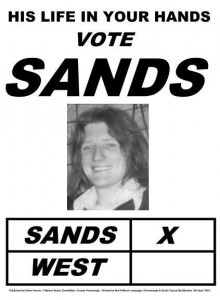4 May 2015
H-Blocks Hunger Strike and 1981 – a year forever etched on our minds and hearts
An Phoblacht/Republican News, 6 May 1999

Sinn Féin Assembly member Mary Nelis, two of whose sons were political prisoners, addressed a packed audience in the Felons’ Club in West Belfast on the Friday night. The following is taken from her moving speech.
1981 was a year that will be forever etched on our minds and hearts, a year when we lost the greatest leaders of this generation, for those who died, died that our’s and future generations would live — as in the words of Bobby Sands — with our heads held high, in our land, a nation once again.
All of us have different memories of that time but what all of us share is that raw deep pain which, even to this day, none of us can really articulate but which we carry within and which, 18 years on, continues to surface, catching us unaware.
Even in the midst of our relief and concern for the men and women [after the first Hunger Strike ended in December 1980] we began to smell the stink of betrayal.
By the end of January, we knew that the British had done what they do best (apart from murder) — lying. And we knew when Bobby Sands announced his decision to embark on the second Hunger Strike, a decision we were in awe of because it was inevitable that he would die . . .
The courage and commitment, the human integrity and political clarity, which was embodied in his announcement, was frightening for us all.
We all shared that burden of knowing that he would die silently.
We threw ourselves into street protest. I was a member of that amazing group of women who, all over the North, made up the Relatives Action Committees (RACs). We came together as mothers, wives, sisters, partners and girlfriends of the prisoners. Some of us were committed to the republican struggle, some of us were not, but we all shared an intense determination to support the blanket men and the women in Armagh.
From 1976 onwards, when a wall of silence was built around the H-Blocks, we set out to let the world know how the British treated prisoners of war.
Women who had never done anything except bear children, look after homes and husbands, suddenly found themselves in the front line with the prisoners, taking on the British war machine, the British and Irish establishments, the churches, political parties, the educational institutions.
Every player was wheeled onto the stage by the British, millions were spent to take on naked men, lying in indescribable filth and women in Armagh who were smearing their menstrual blood on the walls because there was no place else for it.
We [the RACs] became expert at lip reading, smuggling, political speaking, lobbying. We never cried, for there was no time for tears.
When the prisoners began to talk of hunger strike, we renewed and redoubled our efforts. We were on the streets day and night. Banks, post offices, council meetings, days of action, the Russian Embassy, the Mayor’s Ball, the Mayor in Derry, Charles Haughey.
When Bobby Sands began his hunger strike on 1 March we knew only a miracle would save his life, and that seemed to happen when the late and great Frank Maguire, MP for Fermanagh & South Tyrone, died suddenly.

We got Bobby Sands 30,000 votes – the People’s Own MP.
But our joy was short-lived. The British scurried like rats to the House of Commons and passed a law making it illegal for any prisoner to stand as a candidate and we really knew then that he was going to die, and we prayed he would not suffer too much. At 1:45am, on 5 May, Bobby died.
I heard it on the news as I was writing my first letter to my son [in the H-Blocks] and I cried for the first time in five years. The months that followed were an endless procession of walking behind coffins of hunger strikers and those who died on the streets. In that month of May alone, four hunger strikers died — 16,000 plastic bullets were fired. Children, adults died, horrific injuries.
In the election following Bobby’s death we elected Owen Carron and thus began our electoral strategy.

The RACs, those strong politicised women, joined Sinn Féin or got involved in community action groups. But those years were not without a price. Many died, young women, of stress, of heartbreak. But the spirit of freedom as symbolised by the Hunger Strike was carried forward in both the armed struggle and the political struggle. Sinn Féin, the Republican Movement, is now a formidable political force for change in Ireland.
Follow us on Facebook
An Phoblacht on Twitter
Uncomfortable Conversations

An initiative for dialogue
for reconciliation
— — — — — — —
Contributions from key figures in the churches, academia and wider civic society as well as senior republican figures





